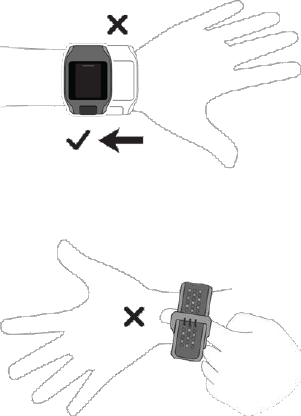
8
Wear the watch in the normal way, with the watch face on top of your wrist and the bottom of the
watch touching your skin, away from the wrist bone.
Do the strap up so that it is tight to your wrist without being uncomfortable.
You get the most accurate results from the heart rate monitor when you are warmed up.
Cleaning your watch
It is recommended that you clean your watch once a week if you use it frequently.
Wipe the watch with a damp cloth as needed. Use mild soap to remove oil or dirt.
Do not expose your watch to strong chemicals such as gasoline, cleaning solvents, acetone,
alcohol, or insect repellents. Chemicals can damage the watch’s seal, case, and finish.
After swimming, rinse your watch with tap water and dry it with a soft cloth.
If your watch has a built-in heart rate monitor, also do the following:
Clean the sensor area and connection pads with mild soap and water as needed.
Do not scratch the sensor area. Protect it from damage.
The heart rate monitor
If your watch has an integrated heart rate monitor, it can help you train more efficiently.
You can choose to use the built-in heart rate monitor, an external one mounted on your bike
handlebars for example, or not to use a monitor at all.
How the monitor works
Your heartbeat is measured by using light to measure changes in your blood flow. This is done on the
top of your wrist by shining light through the skin onto the capillary veins just below the skin and
detecting the changing light reflections.
The performance of the heart rate monitor is not affected by skin type, body fat percentage or body
hair. It IS however affected by how you wear the watch on your wrist and by whether you have
warmed up or not.
Using the heart rate monitor
To get the best performance from the heart rate monitor, follow these tips:


















